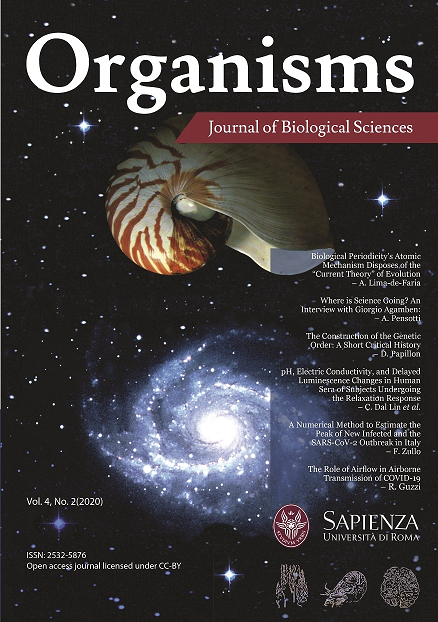Science and the Narration of Science: The Shadow Line Between Explanation and Manipulation
DOI:
https://doi.org/10.13133/2532-5876/17355Abstract
The current use of science as an argument for political purposes reveals an old bias: the idea that science is about truth and therefore is potentially authoritarian. In reality, science is about doubt. The public management of the COVID pandemic should make
us reflect about several aspects of our society.
References
Abbas A H 2020, “Politicizing the pandemic: A schemata analysis of COVID-19 news in two selected newspapers”, International Journal for the Semiotic of Law, July 3 [ahead of print]. Available from: https://doi.org/10.1007/s11196-020-09745-2
Bruce Goldstein E 2010, Encyclopedia of Perception, New
York: SAGE Publications.
Cinelli M et al.2020, “The COVID-19 social media infodemic”, Scientific Reports, vol. 10, article no. 16598. Available from: https://doi.org/10.1038/s41598-020-73510-5
“Coronavirus, Zingaretti aperitivo pubblico a Milano: “Niente panico, isolare i focolai. Il governissimo? Non c’è la crisi” 2020 (27 February), Repubblica[online] https://www.repubblica.it/politica/2020/02/27/news/coronavirus_zingaretti_contro_il_panico-249718891/
“Coronavirus, Galli: “Fatti pochi tamponi, il numero dei contagiati è più alto di quello ufficiale” 2020 (13 March), Repubblica[online] https://video.repubblica.it/dossier/
coronavirus-wuhan-2020/coronavirus-galli-fatti-pochitamponi-il-numero-dei-contagiati-e-piu-alto-di-quelloufficiale/355754/356320)
Dahlstrom M 2014, “Using narratives and storytelling to communicate science with nonexpert audiences”, PNAS, vol. 111, no. 4, pp. 13614-13620.
D’Aria I 2020 (12 February), “Coronavirus, in Italia fa più
danni l’influenza. Ma il timore del virus ci rende più
attenti”, Repubblica[online] https://www.repubblica.it/
salute/medicina-e-ricerca/2020/02/12/news/il_coronavirus_fa_paura_l_influenza_no_ma_si_rispettano_di_
piu_le_regole_di_igiene-248416492/) .
Gardner et al. 2018, “Effect of low-fat vs low-carbohydrate diet on 12-month weight loss in overweight adults and the association with genotype pattern or insulin secretion: The DIETFITS randomized clinical trial”, JAMA, vol. 319, no. 7, pp. 667–679.DOI:10.1001/jama.2018.0245
Ioannidis J P A 2021, “Infection fatality rate of COVID-19 inferred from seroprevalence data”, Bulletin of the World Health Organization, no. 99, pp. 19-33F. Available from: https://www.who.int/bulletin/online_first/
BLT.20.265892.pdf.
Jones M D & Anderson Crow D 2017, “How can we use the ‘science of stories’ to produce persuasive scientific stories?”, Palgrave Communications, vol. 3, article no. 53. Available from: https://doi.org/10.1057/s41599-017-0047-7.
Kuhn T 1957, The Copernican Revolution: Planetary Astronomy in the Development of Western Thought, Cambridge: Harvard University Press.
Mallapaty S 2020, “How deadly is the coronavirus? Scientists are close to an answer”, Nature, vol. 582, pp. 467-468. DOI: https://doi.org/10.1038/d41586-020-01738-2
Mitra et al.2020, “Potential years of life lost due to COVID-19 in the United States, Italy, and Germany: An old formula with newer ideas”, International Journal of Environmental Research and Public Health, vol. 17, no. 12, p. 4392. DOI:10.3390/ijerph17124392.
Schwab K 2020, COVID-19: The Great Reset, Cologny/
Geneva: Forum Publishing.
Tebano E 2020 (2 May), “Coronavirus, come si calcola l’indice di contagio R0 da cui dipenderà quando
potremo tornare a uscire”, Corriere della Sera
=556p_wkq&pids=FR&credits=1&origin=https%
A%2F%2Fwww.corriere.it%2Fcronache%2F20_
maggio_02%2Fcoronavirus-come-si-calcola-l-indicecontagio-r0-cui-dipendera-quando-potremo-tornareuscire-3dc473dc-8c3a-11ea-9e0f-452c0463a855.shtml.
Verstuyf J et al.2012, “Motivational dynamics of eating regulation: a self-determination theory perspective”, International Journal of Behavioral Nutrition and Physical Activity, vol. 9, article no. 21. Available from: https://doi.org/10.1186/1479-5868-9-21
Downloads
Published
How to Cite
Issue
Section
License
Copyright Agreement with Authors
Before publication, after the acceptance of the manuscript, authors have to sign a Publication Agreement with Organisms. The authors retain all rights to the original work without any restrictions.
License for Published Contents

You are free to copy, distribute and transmit the work, and to adapt the work. You must attribute the work in the manner specified by the author or licensor (but not in any way that suggests that they endorse you or your use of the work).





